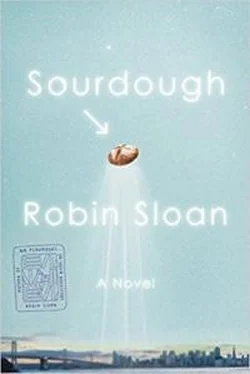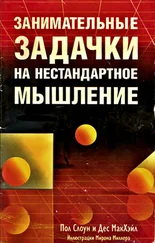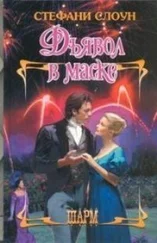“I just don’t feel like it’s mine to give. In fact, it’s the other way around. You don’t understand, because you haven’t worked with it. And I heard a story about it—a warning.” I paused. “I’m going to get rid of it.”
“Please, please, please don’t do that.”
I cracked the passenger-side door. “I’m sure you’ll find another way to make your stuff work. A better way.”
“Let’s keep talking about this!” Jaina Mitra called as I stepped out of the car. She was reaching over, her seat belt cutting into her shoulder, her expression pleading. “Keep that starter. Keep it alive!”
THE ISLAND OF THE MAZG
THAT NIGHT, I SLEPT ON MY FUTON on Cabrillo Street, satisfied with my decision. There were paths ahead that didn’t require the Clement Street starter. I still had the Vitruvian, and I had become possibly the world’s leading expert on the use of robot automation in kitchen processes.
In the morning, I was startled awake by a bad dream that melted away as soon as I tried to remember it. It was dark outside. I decided I would go to the Marrow Fair and make my peace with the starter. It felt like it should be a private affair.
I rode my bike to the pier and waited for Carl to arrive. The atmosphere was close and clammy, heavy clouds hanging low. Some days, working in the Marrow Fair, I missed the sky, but this would not be one of them. It would be cooler down in the depot.
The Omebushi approached the pier, chugging merrily. Aboard, Carl’s mood matched mine.
“Haven’t seen you in a while,” he said, his voice still sticky with sleep. “People said you were spending the night.” He poured us both some coffee and launched his boat again.
We cleared the Bay Bridge and rounded Yerba Buena Island on the way to Alameda. Then, we both saw it at the same time.
Ahead, the silhouette of the island had changed. A hazy bulge loomed in the center of the airfield. There was a new structure there—vast, round, and somehow built overnight.
Was this part of Mr. Marrow’s grand opening?
The Omebushi brought us closer.
Though it was as large as one of the hangars, it wasn’t a proper structure, but rather an organic form with a swollen, gaseous look. It might have been a rising hot-air balloon or a crashed dirigible.
Or, as I considered it, an enormous panettone.
Carl muttered a curse. Keeping one hand on the wheel, he dug in the compartment beneath his seat, produced a pair of binoculars, and tossed them into my lap.
Through the binoculars, I could make out the texture of the structure, and a sick feeling bloomed in my gut.
The forgotten lemon I’d discovered in my explorations of the depot’s dark corridors—I had picked it up, only to discover that the bottom was fuzzed over with fungus, velvety to the touch. Out of sick curiosity, I’d held my breath and peeled the lemon’s skin away to discover that the fungus had padded its interior with airy filaments.
Through the binoculars, I saw that, but huge.
The billowing surface looked velvety like the underside of the lemon, and in the softness there was a pattern of ridges and depressions, and in that pattern, there was the unmistakable swirl of faces.
I put the binoculars down.
I knew those faces.
The Omebushi bumped roughly against the tiny pier. “Better get in there and see what’s happening,” Carl said.
I waved my bone-key token in front of the bay-side door. It called me skinny and unlocked, but when it opened, there was no depot.
Instead, I stared at a wall of the same material that bloomed on the airfield. Pale, creamy, billowing, and patterned with familiar faces. They were variously ecstatic and anguished and accusing and calm.
Up close, the smell was overpowering. Banana and gunpowder.
For a moment I was hypnotized. Then, tentatively, I extended a finger and poked at one of the faces. The substance yielded like foam.
It had the consistency of Lembas.
It was Lembas.
Carl was at my side, holding an oar. “Careful there,” he said. He prodded the ballooning substance with the butt of the oar and it fell away; behind the Lembas was more Lembas. The depot was full of it.
* * *
AGRIPPA’S GOATS WERE CLUSTERED at the edge of the airfield, clearly perturbed by the apocalyptic puff pastry that had invaded their domain. Their keeper stood among them; he looked more placid.
“Agrippa!” I called. “How did this happen?”
“Don’t ask me,” he said. “The goats woke me up. They were freaking out.”
“Have you called anyone?”
“Nope.”
I wanted to sputter in protest. I remembered who I was dealing with.
I ran to the control tower, descended the spiral staircase, and waved my bone key. The door opened— STILL — TOO — SKINNY —revealing the concourse.
Just inside, my workstation was safe, unaffected. The Vitruvian wobbled apprehensively. The Clement Street starter was quiet in its tub. But farther down the concourse, where Jaina Mitra’s lab had been, the Lembas had formed a massive trunk that reached up to grip the ceiling. There, it splayed out in a dramatic many-fingered star, and one of its fingers had found the skylight above the lemon grove and pushed its way through to form the base of the bulbous structure rising on the airfield. Below it, the lemon grove had been consumed entirely. A few dark leaves were suspended in the Lembas like feathers on the nose of a cartoon cat.
The great bloom of Lembas blocked the skylight, so the only illumination came from the grow rooms, which cast their pink glow across a rippling scene that also had a soundtrack: Chaiman’s album was playing, and not the spare overture but the later tracks, the ones in which he had accelerated the songs of the Mazg and overlaid them with rising sirens, bursts of noise, and a driving oonce-oonce-oonce .
It was a fungal party hellscape.
The Lembas was not finished. Around the absorbed lemon grove, it was growing in hungry surges. Was it obeying the oonce s? I watched it bulge sickly in time to the music.
Then a figure darted into view. It was Horace: wielding a wide book, charging forward, poking at the Lembas, slashing it, gaining ground.
Just beyond the grove was his library.
Horace was holding the Lembas at bay.
His shouts echoed. “ Back! ” he hollered. “ Back! ”
I kicked at the brakes on the Vitruvian’s wheeled base, spun it around, and pushed forward. We coasted together down the yellow-tape road, the arm’s momentum almost overbalancing it as we caromed into workstations and refrigerators before reaching the place where Horace was making his stand. He had his heels set, swiping with the book as the Lembas encircled him, oonce by oonce .
I locked the Vitruvian’s brakes and grabbed at Horace’s shirt. “Let the arm do it!” Then, all my scorn for the programmers on Interface drained away as I shouted, “Arm, change task ! Say hello! ” and the Vitruvian began to swing in a wide, slow arc. Where Horace’s book had been making scratches, the arm made great gouges. It was tireless. The Lembas could not pass.
I heard a howl and turned to see Stephen Agrippa emerge from the depot’s vehicle ramp. He was running, Hercules the alpaca beside him, and all the goats a pace behind. Agrippa urged them forward with feral hoots and yips. Hercules spat.
The Lembas was vast but brittle; where its growth had slowed, it left an airy matrix, like the crumb of one of my loaves but scaled up massively. So, when we struck it—the Vitruvian with its great fist, Hercules with his hooves, Agrippa and I taking swipes with fingers curled into claws—it broke away in ragged chunks that tumbled and bounced to be consumed by the ravenous and, frankly, terrifying goats.
Читать дальше










